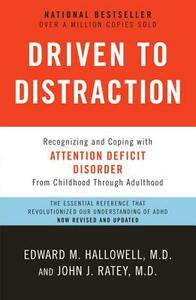Take a photo of a barcode or cover
314 reviews for:
Driven to Distraction: Recognizing and Coping with Attention Deficit Disorder
John J. Ratey, Edward M. Hallowell
314 reviews for:
Driven to Distraction: Recognizing and Coping with Attention Deficit Disorder
John J. Ratey, Edward M. Hallowell
informative
slow-paced
I wouldn't exactly call it outdated, but one definitely notices that this was written before ADD/ADHD was a household name. Other than that, very good introduction. My husband and son have both been diagnosed and this has given me a better idea of what's going on in their heads as well as a better idea of where to go from here.
informative
reflective
medium-paced
emotional
funny
hopeful
informative
inspiring
reflective
fast-paced
hopeful
informative
reflective
medium-paced
informative
medium-paced
Geared toward parents or adults, and a little dated from age (but don’t entirely skip the med chapter), this is a helpful resource I’ll be adding to my practice. Lots of good tips, especially for relationships and work.
I haven't officially received a diagnosis of ADHD, but this book has certainly made me think that I do have it. It's helpful to have some of the nomenclature necessary to convince the doctor to at least consider it.
I actually skimmed a lot because I was diagnosed last year and did tons of reading. That being said, this would be great for a newly diagnosed person, someone who thinks they have adhd, or for a loved one trying to understand their crazy partner.
as a person with adhd i have felt often that no one truly understands what it feels like to live inside my brain, this book taught me other wise. that those with adhd get it and these aren’t lone or crazy reactions or feelings. for allowing me that insight it gets 3 stars.
as a book about adhd it was clearly not written for people with adhd. the chapters were all about 2 hours long (audiobook) he constantly read lists of symptoms and treatments with about 25-50 items and he rarely quickly got to the point. the most useful part of the book was the case studies and the affirmations it provided me with.
i also am now much more aware of how far we have come in understanding and treating adhd over the last 20years and how much stigma the disorder carried in the early stages. i am thankful to have been diagnosed in a time with more understanding and look forward to continued progress in the understanding treating and diagnosing of adhd. (also him saying it is more common in boys is very silly bc it is just more commonly diagnosed in boys. the differences in symptoms btwn boys and girls with adhd leads many girls to go undiagnosed, unless extremely hyperactive, until later in life or never.
as a book about adhd it was clearly not written for people with adhd. the chapters were all about 2 hours long (audiobook) he constantly read lists of symptoms and treatments with about 25-50 items and he rarely quickly got to the point. the most useful part of the book was the case studies and the affirmations it provided me with.
i also am now much more aware of how far we have come in understanding and treating adhd over the last 20years and how much stigma the disorder carried in the early stages. i am thankful to have been diagnosed in a time with more understanding and look forward to continued progress in the understanding treating and diagnosing of adhd. (also him saying it is more common in boys is very silly bc it is just more commonly diagnosed in boys. the differences in symptoms btwn boys and girls with adhd leads many girls to go undiagnosed, unless extremely hyperactive, until later in life or never.

